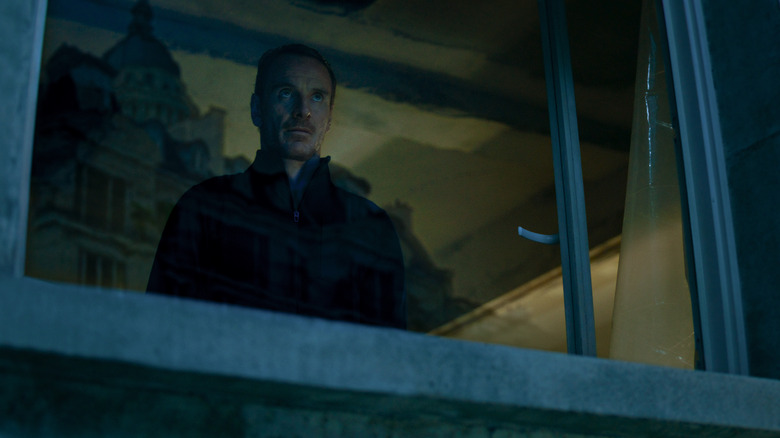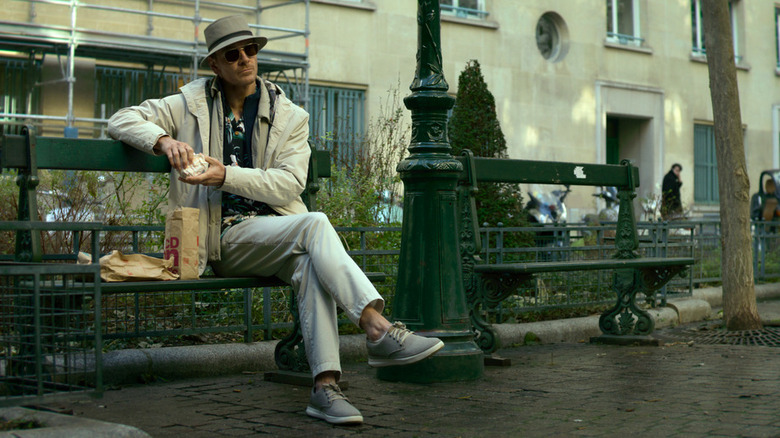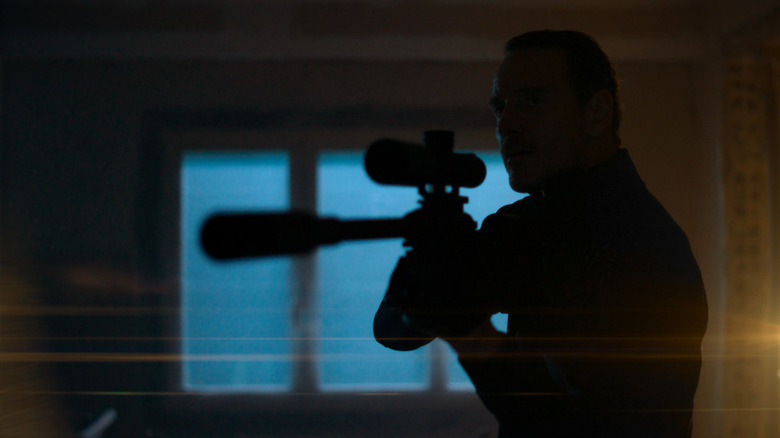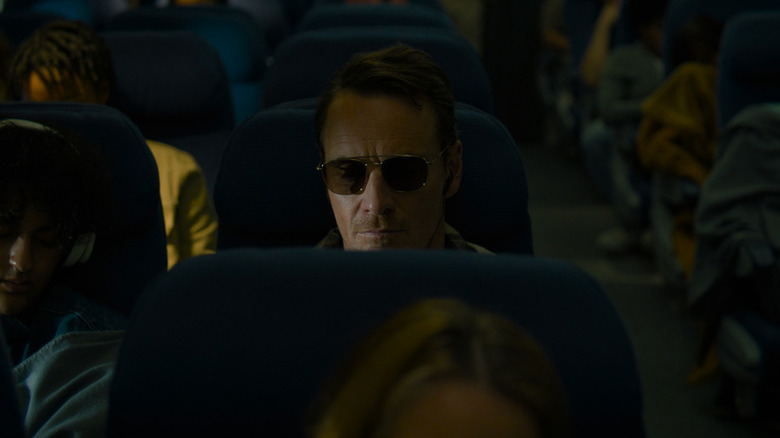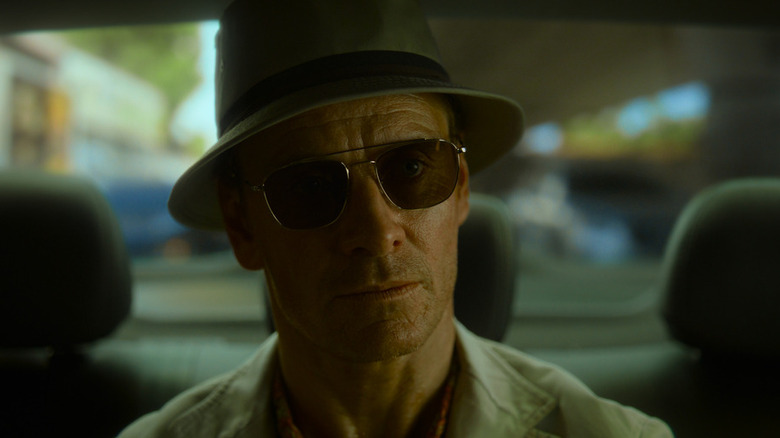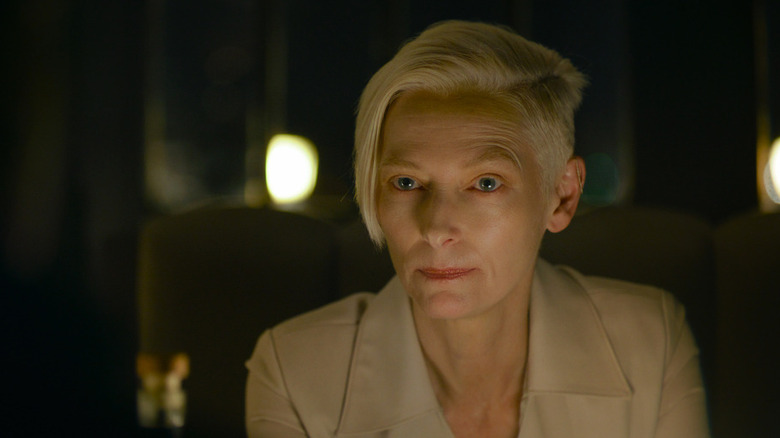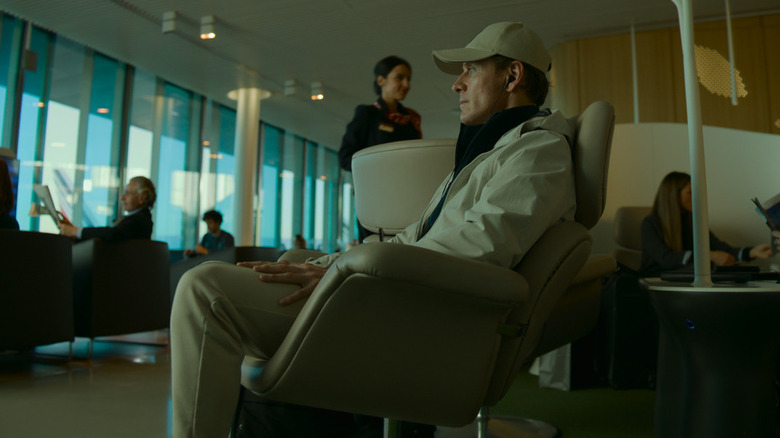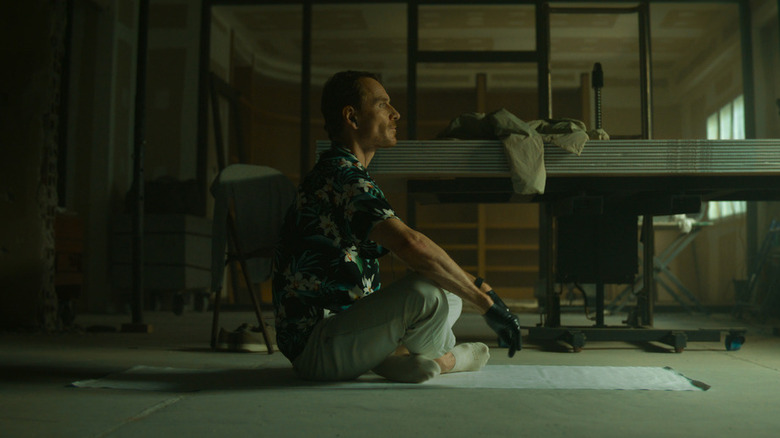The Killer Ending Explained: Accept Yourself
This article contains major spoilers for "The Killer."
How often do you think about your job? In terms of your daily duties, upcoming deadlines on your calendar, and other day-to-day issues, probably a fair amount. Yet how often do you consider your job — not just as a checklist but as a vocation — as something you're putting out into the world, as something that defines who you are as a person?
As the imaginary demon of toxic masculinity, Tyler Durden, famously says in David Fincher's "Fight Club," "You are not your job." Of course, Tyler is not to be trusted, and "Fight Club," like a majority of Fincher's filmography, is a pitch-black satire. What if you are your job, and what if your contribution to the world is both minimal and actively negative? What if your job, and all jobs, were this destructively banal, and everyone from sanitation staff to billionaire CEOs were unknowingly part of this sick system that ensures mutual self-destruction?
It's these questions and more that are raised by Fincher's latest dark comedy, "The Killer," a film that's not coincidentally written by "Se7en" scribe (and "Fight Club" script doctor) Andrew Kevin Walker. Combining the slick, international crime intrigue of his "The Girl With the Dragon Tattoo" with the pointed amorality of "Fight Club" and "Gone Girl," Fincher's "The Killer" takes aim at professionalism and professions in 2023, set in a world where no one is innocent, and everyone is simultaneously a killer and a victim.
Panic
Fincher's dark satire begins as soon as the opening titles drop, which is to say immediately: after a stylishly edited, kinetic montage made up of intrigue, weaponry, and violence, we're introduced to The Killer (Michael Fassbender), a man who introduces himself with voiceover narration (which makes up the majority of his dialogue, as he hardly speaks aloud) exclaiming how exhausting it is to do nothing. Doing nothing, it seems, is what actually fills most of his time during his work as a hitman for hire. In Paris for a job, The Killer waits for his target to arrive, squatting inside an abandoned WeWork office that still gets its mail delivered on time, an indication of how systems of business continue without fail, despite visual evidence to the contrary.
As The Killer waits around, chowing down on an Egg McMuffin while listening to his "work playlist" (which is almost entirely made up of songs by The Smiths) and espousing his philosophies on morality and life that are about as deep as the back of a Snapple cap, it seems that Fincher and Fassbender may be presenting the character as a blank to reveal him as an ultra-competent, intimidating professional, a la Denzel Washington's titular fixer in "The Equalizer" films. It turns out to be quite the opposite: when The Killer's Target (Endre Hules) finally arrives, he misses his long-range shot and hits Target's hired Dominatrix (Monique Ganderton) instead.
With one small gesture begetting one huge mistake, The Killer is forced to immediately go on the run, using his exit strategy despite having failed his mission. A brief phone call with his handler indicates that his life may be forfeit as a result of disappointing their powerful client, and The Killer paranoiacally eyes several people on his long journey home.
Girlfriend in a coma
It turns out that The Killer needn't have worried about his safety; after all, real life is far too cruel and unfair for that. Instead, as he arrives back at his secluded home in the Dominican Republic, the assassin discovers that his girlfriend, Magdala (Sophie Charlotte), has been brutally assaulted by two other assassins in retribution for his failure. The Killer visits Magdala at a local hospital, and the woman proudly confesses her fidelity and bravery to her lover, telling him she didn't give up his identity or other information despite her torture. In a "Taken" movie, for instance, such behavior would come off as truly heroic; here, her suffering is deeply, darkly ironic, as she's protected the life of a man who seems hardly worth saving.
Although The Killer vows to Magdala's family that such an atrocity will not be allowed to happen again, essentially announcing his new quest for revenge, the man acts less like an enraged "John Wick" and more like an office drone who's just received a bad memo. In other words, although "The Killer" is ostensibly a revenge movie, it's deliberately a dispassionate film.
Fincher devilishly plays with assassin movie iconography, dressing Fassbender (in collaboration with costume designer Cate Adams) like Alain Delon in Jean-Pierre Melville's "Le Samourai" (a movie that shares plot elements with John Woo's "The Killer," surprise, surprise) but having him be less "cool" and more dispassionate. As Fincher explains in the film's official press kit: "We thought it would be interesting if the 'cool' assassin movie tropes were all taken away." Although the film is adapted from a French graphic novel written by Alexis "Matz" Nolent and illustrated by Luc Jacamon, it retains little of that comic book's retribution-fueled anger. For the movie's Killer, revenge looks disturbingly like just another day at the office.
Work is a four letter word
After The Killer gets a small bit of information about the assassins who attacked Magdala, learning that it was a duo made up of a brutish man and a woman who resembles a Q-Tip, he travels to New Orleans to see his handler. In narration, he reveals that The Lawyer known as Hodges (Charles Parnell) is not only the man who arranges his jobs but is also his mentor, the man who dissuaded him from pursuing a career in law and got him into the murder business.
As such, you'd think that a confrontation between these men would be fraught with emotion. So, of course, Fincher and his cast play it differently, with Hodges casually admonishing The Killer for returning home in the first place, let alone embarking on a quest for revenge. Hodges treats The Killer like an employee he's about to downsize, feeding him shrug-worthy platitudes and meeting the assassin's dispassion with cold detachment. Attempting to wring the information he wants out of Hodges the hard way, The Killer plants several nails inside the man's chest, causing heavy bleeding that could still not be fatal if he gets the information in time, showing that he has 911 ready to dial on his phone. Yet again, The Killer screws up, miscalculating the amount of time it'd take for Hodges to bleed out, and the Lawyer dies.
Fortunately, The Killer has Hodges' secretary, Dolores (Kerry O'Malley), as insurance, and he gets a couple of addresses from her Rolodex before coldly snapping her neck. Helluva way to quit your job, for sure, and the film doesn't even allow for any wish fulfillment in the process (a distinct contrast to something like 2008's "Wanted").
These things take time
The first address from Dolores' Rolodex belongs to The Brute (Sala Baker), a thug who embodies the term "Florida Man": jacked, stacked, and living in the slums of St. Petersburg. The Killer does his usual methodical thing in tracking him down, stalking the man, learning his habits, observing his vicious pet pit bull, and so on.
When the time comes to make the hit, The Killer sets himself up for an assured victory by drugging the pit bull and sneaking into the house undetected while The Brute is taking a shower. Of course, this being Fincher and "The Killer," the assassin's confidence in his professionalism is once again misplaced, as The Brute sneak attacks from a darkened corner, instigating a knock-down, drag-out fight in every sense of the word.
It's as good a scene as any to point out just how measured Fincher and Walker's tone for the film is. The fight is indeed suspenseful and thrilling, and cinematographer Erik Messerschmidt utilizes Fincher's preferred dark amber palette well, allowing the scene (and the whole film) to look coldly gorgeous. Yet the sheer amount of time the fight takes to resolve itself means that the visceral quality of the scene gives way to an almost pathetic bit of physical comedy, something that is reminiscent of the fight over sunglasses in John Carpenter's "They Live." "The Killer" is going for laughs more than thrills, and not necessarily in the title character's favor. For even when The Killer eventually bests The Brute, the exacting of his revenge is hardly victorious; it feels more like when a FedEx employee delivers a particularly cumbersome parcel.
That joke isn't funny anymore
If it wasn't already apparent by this point in the film that Fincher is making a comedy, he has the next chapter of the film (the movie is segmented into several chapters) centered around a character literally telling a joke. That character is The Expert (Tilda Swinton), the female half of the duo who assaulted Magdala, and The Killer is a little surprised (in voiceover, as he never breaks his stoic facial expression) to learn that she's living her life amongst the "normies" in suburban Connecticut.
Of course, her choice of locale is there to serve the film's major theme of the way corporate culture has invaded and taken over nearly every one of our lives, and The Killer's meeting with The Expert at a swanky restaurant (at which The Expert knows the chef and staff personally) carries with it the feeling of an employee meeting with upper management after hours. Sure enough, the "executive" attempts to break the ice with The Killer (whom she knows is there to do her in) by telling an off-color joke all about a hunter and a sodomizing bear. The point of the joke is that the hunter is revealed to like the bear violating him much more than he does the hunting, as The Expert implies that The Killer may subconsciously enjoy failure; maybe he didn't accidentally miss The Target.
In any case, The Killer gives The Expert an ignominious end, shooting her just beside a waterfall in the cold, wintry night; a sad joke of an ending.
Money changes everything
For all its tonal subversiveness, "The Killer" is a revenge story at its core, and one of the tropes of the revenge story is that the character seeking revenge is inexorably changed during the quest. Usually, this takes the form of some moral awakening, with the revenge-seeker discovering that their retribution is just as reprehensible (if not more so) than the atrocity that sparked it ... or something along those lines.
Such a revelation indeed comes to The Killer, but morality has little to do with it. He finally tracks down The Client, a billionaire named Claybourne (Arliss Howard), in Chicago, partially because the man is not at all attempting to hide: he tools around the city in a vehicle with a vanity plate and goes to an expensive gym with his personal trainer.
After breaking into Claybourne's home, The Killer inquires at gunpoint why The Brute and The Expert were hired to attack him at his hideaway, and Claybourne is genuinely shocked and baffled. According to him, when The Lawyer informed him that the hit had been botched, Hodges offered him "insurance" for an additional fee, a term which the clueless Claybourne thought little more of than someone purchasing insurance on a laptop at Best Buy would. Turns out that insurance was, of course, Hodges putting a hit out on The Killer, something which itself got screwed up.
It's here that The Killer has his breakthrough, seeing his profession for what it is: just another soulless, rudderless, irresponsible corporation, filled with need-to-know employees who merely pass a buck down to the lowest drone, whose actions cause all sorts of collateral damage to innocents. Claybourne is any number of CEOs who haven't the slightest idea about what their company does, let alone how the real world works and what consequences arise because of their actions. Perhaps because of this, The Killer merely threatens Claybourne, leaving the billionaire scared and alone — but alive.
Half a Person
In the film's epilogue, The Killer is seen back at his secluded home in the DR, sharing a beachside sunning next to a recovered Magdala. It's an idyllic finale that's not out of place for your average globe-spanning assassin movie, and yet, thanks to the film's tone and context, it resembles something like a travel agency ad: the vacation fantasy of the cubicle jockey.
That's because, of course, The Killer isn't just like us; he is us, and he says as much in his climactic voiceover, aligning himself with "the many" instead of "the few" as he had done earlier. He eats McDonald's, drinks Starbucks, shops at Amazon, and even listens exclusively to that hip, vintage indie band that was once used as a signifier of deep musical taste in media like "(500) Days of Summer." His job may be unusual on the surface, but it turns out it's just like every other workday job in the world; in fact, it may be a little more honest, for at least the people dying as a result of it is an intentional consequence. The Killer isn't Patrick Bateman from "American Psycho," a murderer able to hide in plain sight of money-blinded capitalists; he's Michael Scott from "The Office," or any number of sitcom-based aliases that he uses to travel incognito.
In other words, The Killer is aggressively average, a cog in a wheel, part of the big system, and he's accepted this identity. Can the rest of us follow suit? In some ways, "The Killer" is a response to Tyler Durden and the late-'90s ennui of "Fight Club," a more grown-up and mature (if defeated) reaction to the oppressive reality of our corporate world. Revenge, revolution ... these are childish fantasies. Maybe all we have to look forward to is a good severance package or a robust retirement plan. Maybe we're all the hunter in that bear joke, too addicted to being violated. It's certainly going to be our fates if we do nothing, and again, as The Killer says at the top of the film, it's exhausting to do nothing.
